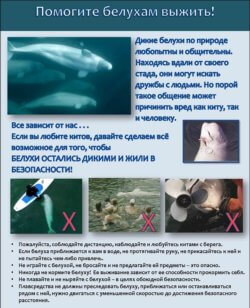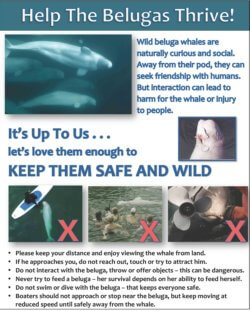Over the past several weeks, beluga whales have been showing up on the far east coast of Russia in bays and at beaches near Vladivostok Harbor. This is not far from where the last 31 belugas were released into the Bay of Uspeniya Lavosky in the Primorsky Krai district when they were freed from the infamous “whale jail” last year. Local observers are assuming that these whales are members of that group.
The whales have been approaching recreational boaters, and people have been seen petting them and interacting with them. This kind of behavior is dangerous, both to the whales and to the humans who encourage it.
In the following video, our colleague and advisor Jean-Michel Cousteau of the Ocean Futures Society, who joined with the Whale Sanctuary Project in leading our Whale Aid Russia program last year, explains why it is so very important for people not to engage with whales who approach them.
The orcas and beluga whales at the “whale jail” had been captured illegally in 2018. And throughout 2019 the Whale Sanctuary Project worked closely with the Russian government to help prepare the whales to be returned to the ocean. All of them were successfully returned to the ocean: all of the orcas and most of the belugas to the Sea of Okhotsk, from where they had been captured, and the last 31 belugas to the Bay of Uspeniya Lavosky.
“We are currently working with local volunteers in their efforts to keep the belugas safe and wild,” said Charles Vinick, Executive Director of the Whale Sanctuary Project. “We’re providing guidelines for people to stay away from these whales and not to engage with any whales who approach them.”
Catherine Kinsman, our Nova Scotia beluga expert, has been instrumental in leading our effort to adapt her standard guidelines “Sociable Belugas Whales – Things You Should Know” to the current situation in Russia. As co-founder of the Whale Stewardship Project, which pioneered the world’s first research protection and education programs for sociable beluga whales, she has developed this expertise over more than two decades working with lone sociable belugas in Atlantic Canada.


Catherine produced the poster above, in which she urges beachgoers and boaters to stay away from these beluga whales, both for their own safety and for the safety and well-being of the animals.
“I completely understand that a beluga’s appeal can seem irresistible,” she said. “But for the belugas’ sake and people’s safety, having the will to resist engaging with them is the most responsible, sensible and selfless action a person can take.”